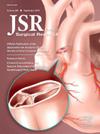Prevention of Open Surgical Treatment Complications of Patients with Occlusive Lesions of the Aortoiliac Segment
IF 1.8
3区 医学
Q2 SURGERY
引用次数: 0
Abstract
Introduction
Surgical procedures on large arteries are associated with an increased likelihood of complications and a long rehabilitation period, making it extremely important to reduce the risks of such operations. The study aims to examine various aspects of preventing complications of surgical treatment, including preoperative preparation, intraoperative management, postoperative observation, and analysis of factors that determine treatment outcomes.
Methods
The present study used clinical data from 300 patients undergoing surgical treatment of aortoiliac segment occlusion to evaluate the effectiveness of preoperative correction. The study was conducted over 3 ys, from 2018 to 2023, at the university clinic of the nonprofit joint-stock company Semey Medical University.
Results
The study found that preoperative optimization, including medical correction of diabetes mellitus and chronic obstructive pulmonary disease, led to improved functional performance in patients. In the group of patients who underwent preoperative correction, intraoperative complications were recorded in only 12% of patients, while in the control group, where such correction was not performed, this figure reached 24%. A similar trend was observed concerning postoperative complications: 18% compared to 34% in the control group.
Conclusions
Multiple logistic analyses confirmed the critical role of diabetes mellitus and chronic obstructive pulmonary disease as risk factors for postoperative complications, emphasizing the need to address these conditions before surgery. The practical significance of the study is to confirm the need for preoperative drug correction to reduce the risk of intraoperative and postoperative complications and improve the outcomes of surgical treatment of aortoiliac segment occlusion.
求助全文
约1分钟内获得全文
求助全文
来源期刊
CiteScore
3.90
自引率
4.50%
发文量
627
审稿时长
138 days
期刊介绍:
The Journal of Surgical Research: Clinical and Laboratory Investigation publishes original articles concerned with clinical and laboratory investigations relevant to surgical practice and teaching. The journal emphasizes reports of clinical investigations or fundamental research bearing directly on surgical management that will be of general interest to a broad range of surgeons and surgical researchers. The articles presented need not have been the products of surgeons or of surgical laboratories.
The Journal of Surgical Research also features review articles and special articles relating to educational, research, or social issues of interest to the academic surgical community.

 求助内容:
求助内容: 应助结果提醒方式:
应助结果提醒方式:


